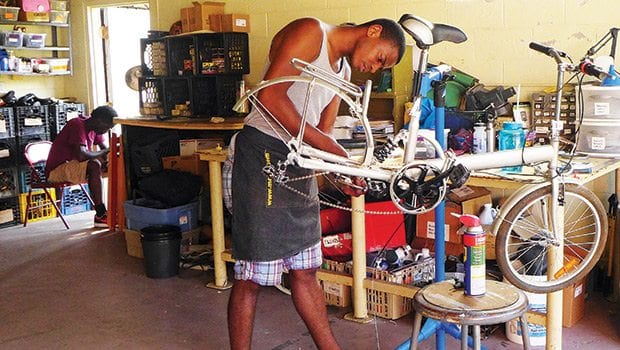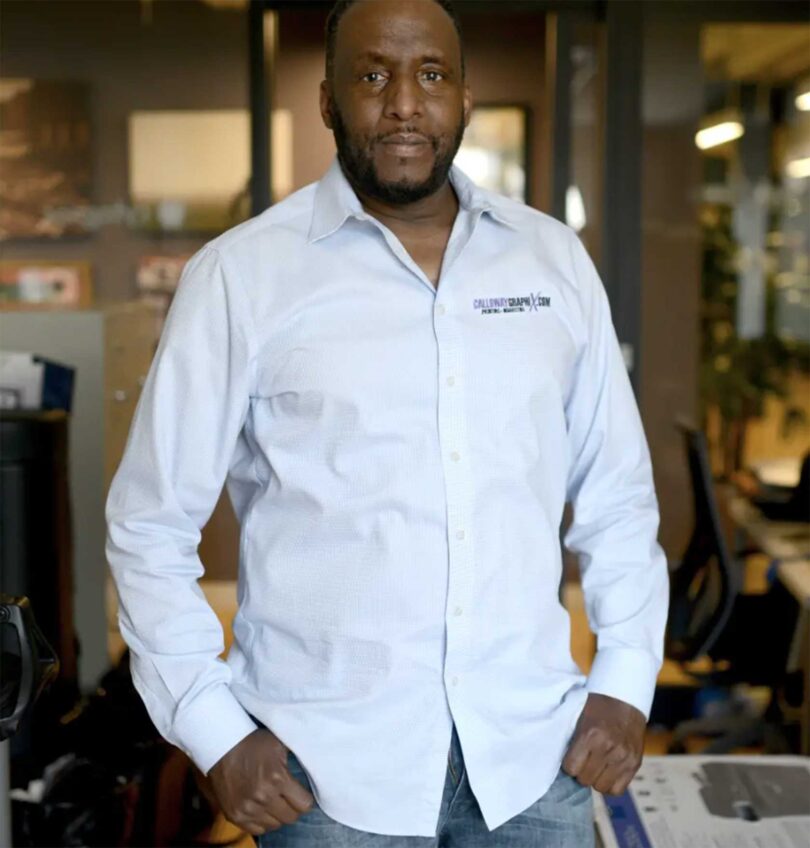Building bikes and building a business
Dorchester resident opens Bowdoin Bike School teaching and repair shop, looks to expand next year

Noah Hicks has rolled open the doors of his new Bowdoin Bike School at Codman Square.
Located at 14 Southern Ave., the store is settled into a high-ceilinged garage and opens onto a yard. On the ceiling, tires hang from hooks between fluorescent lights, and one corner features boxes of supplies for sale.
Drew Vernalia, assets manager at Codman Square Development Corporation, offered suggestions for the store as Hicks repaired a bike. The store had its grand opening on Saturday, August 15th, and Tuesday found them in discussion on how to improve the space. Vernalia proposed they put a sign on the corner, listing the hours, and tie on balloons to attract attention.
Though only recently opened, Bowdoin Bike School’s current location is just a step along the way to Hicks greater dream: opening the Bike Kitchen, a larger bicycle repair shop and café. Hicks intends to use the Bowdoin Bike School as a chance to set up operations and prepare for running a bigger business before he moves into the new space next year. He is undecided on whether he will keep 14 Southern Ave. running in addition to the Bike Kitchen, or move all operations.
Regardless of location, the bike school’s mission will be the same.
With Bowdoin Bike School, Hicks brings affordable bicycles and materials to the neighborhood and encourages customers to learn how make their own repairs.
“When people walk up and want you to fix bikes, it can be a learning experience,” said Hicks. When setting up the Bowdoin Bike School he made sure there would be space for customers to sit and watch him or his employees work.
Filling a void
The store fills a needed gap in the community. There are no bike shops in Roxbury and the nearest shop to Codman Square is Ashmont Cycles in Peabody Square, which serves a different market, Hicks said.
“I’d say we [Bowdoin Bike School and Ashmont Cycles] don’t work in competition, we work in connection,” said Hicks, “They sell new stuff and perform some really niche repairs we don’t do here.”
Bowdoin Bike School stands out for its low prices and draws in “people who can’t afford a lot of the used bike shops in Boston.”
Modestly-priced bicycles provide affordable transportation. Because of this, bikes have been hailed as key to escaping economic distress.
“The number one barrier for people to get out of poverty is not education…it’s transportation,” said Richard Fries, executive director of the Massachusetts Bicycle Coalition, or MassBike, the nonprofit under which Bowdoin Bike School operates as an educational program.
However, a major impediment to bicycle use is not knowing where or how to make repairs once the vehicles get damaged.
“The absence of a lot of bike shops is very much akin to the absence of access to supermarkets,” said Fries. “We as a culture are not providing very good access to it [bicycles] to the people who could benefit most. And Noah is,” said Richard Fries.
“In my work here I’ve been shocked to learn that a lot of people have bikes in neighborhoods that could use bikes, but they don’t have any air in the tires … these are very low-budget quick fixes, but they’re not being done,” Fries explained, “Noah’s right in that void doing that stuff.”
Fries said that biking has had a surge of popularity across all demographics and especially among youth.
Bowdoin Bike School also drew praise for green and health causes.
“[The bike store] is promoting bikeability and people biking instead of driving. It’s good for the environment and promotes people’s health,” said Drew Vernalia of Codman Square Neighborhood Development Corporation.
Business assistance
Codman Square NDC rents the space to Bowdoin Bike School and provides Hicks with business assistance. Codman Square NDC aims to achieve Leadership in Energy & Environmental Design certification for the entire Talbot Norfolk Triangle District and was drawn to the bike store a way to further healthy and environmentally-favorable practices in the neighborhood.
All this promise makes expanding the bike school and its reach a tempting prospect.
In collaboration with Historic Boston Incorporated and The American City Coalition, Hicks submitted a proposal for HBI to renovate the old Comfort Station at 611 Columbia Road in Uphams Corner, Dorchester and rent it to Hicks for use as the Bike Kitchen bike store and café. TACC would provide assistances to both parties.
The city has tentatively approved their bid.
“Between now and this time next year, we should be developing and getting ready to move,” said Hicks.
When Codman Square NDC offered Hicks a list of available spaces, he chose 14 Southern Ave. because it was available soonest. Given the limited space there, Hicks only can employ three to four people, but envisions a bigger operation once he moves into the Comfort Station.
A larger location will enable Hicks to create more well-paying jobs, he said. He intends to “take what we do here, whether it’s free clinics, workforce training, helmet distribution, field days, or other operations out in the community and give it at home at Bike Kitchen.”
Unlike Bowdoin Bike School, Bike Kitchen will be for-profit, but Hicks promises they won’t forget their purpose: “Bowdoin Bikes is not going anywhere either in mission or execution.”
Hicks is using the current store to get his business started and train employees: “Here [at 14 Southern Ave] we’re developing our talent and the workforce before launching Bike Kitchen” he said.
To make the Bike Kitchen a reality, HBI and Hicks will need to secure funding. Hicks will cover the startup costs of the business while HBI will pay for the building’s rehabilitation. At this point, Hicks is unable to estimate his funding goal because he is still exploring ways to reduce costs.
They have a year to acquire financing before the city gives final approval.
Jeffrey Morgan of HBI said they are “very early in the process” and will be “reach[ing] out to various funding sources: foundations, private donors, [and] making grant applications.”
Neither HBI nor Hicks have secured a financial source yet, although Hicks intends to run an Indiegogo campaign “to close whatever fundraising gap remains,” should his other sources fall short. In the past Hicks raised $7,000 in an Indiegogo campaign to support his operations. The donations would go towards bicycle parts, tools, food for the staff and space rental, the campaign said.
Hicks is largely self-taught at bike repair. “A lot of it is trial and error,” he said, noting that each time he refurbished a bike he learned from his mistakes. He sold his first restored bike seven years ago. From there he went on to rent space at Broadway Bike School in Cambridge and use its equipment to refurbish bikes. Bowdoin Bike School is his first brick-and-mortar store.
Bowdoin Bike School is open 12pm-6pm Wednesday through Saturday. Tuesdays are reserved for running a free clinic at the Cornerstone at the corner of Washington and Bowdoin Streets.






